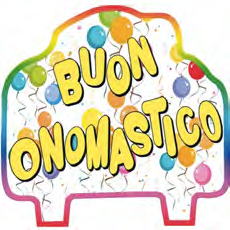 In Italy, as well as in many other countries in Europe and Latin America, people celebrate the day of the year associated with one’s given name.Italians call it onomastico.
In Italy, as well as in many other countries in Europe and Latin America, people celebrate the day of the year associated with one’s given name.Italians call it onomastico.
The custom originated with the Catholic and Orthodox calendar of saints, where believers named after a particular saint would celebrate that saint’s feast day. In Italy, one’s onomastico is seen to be almost as important as one’s birthday – often people receive small gifts on their Onomastico.
Ninety percent of Italians are named after saints for varying reasons. Many are named this way simply due to being born on a particular saint’s day, while others because of patron saint of their town. Still others are given their name because their parents have a special connection or received a grace from a specific saint.
